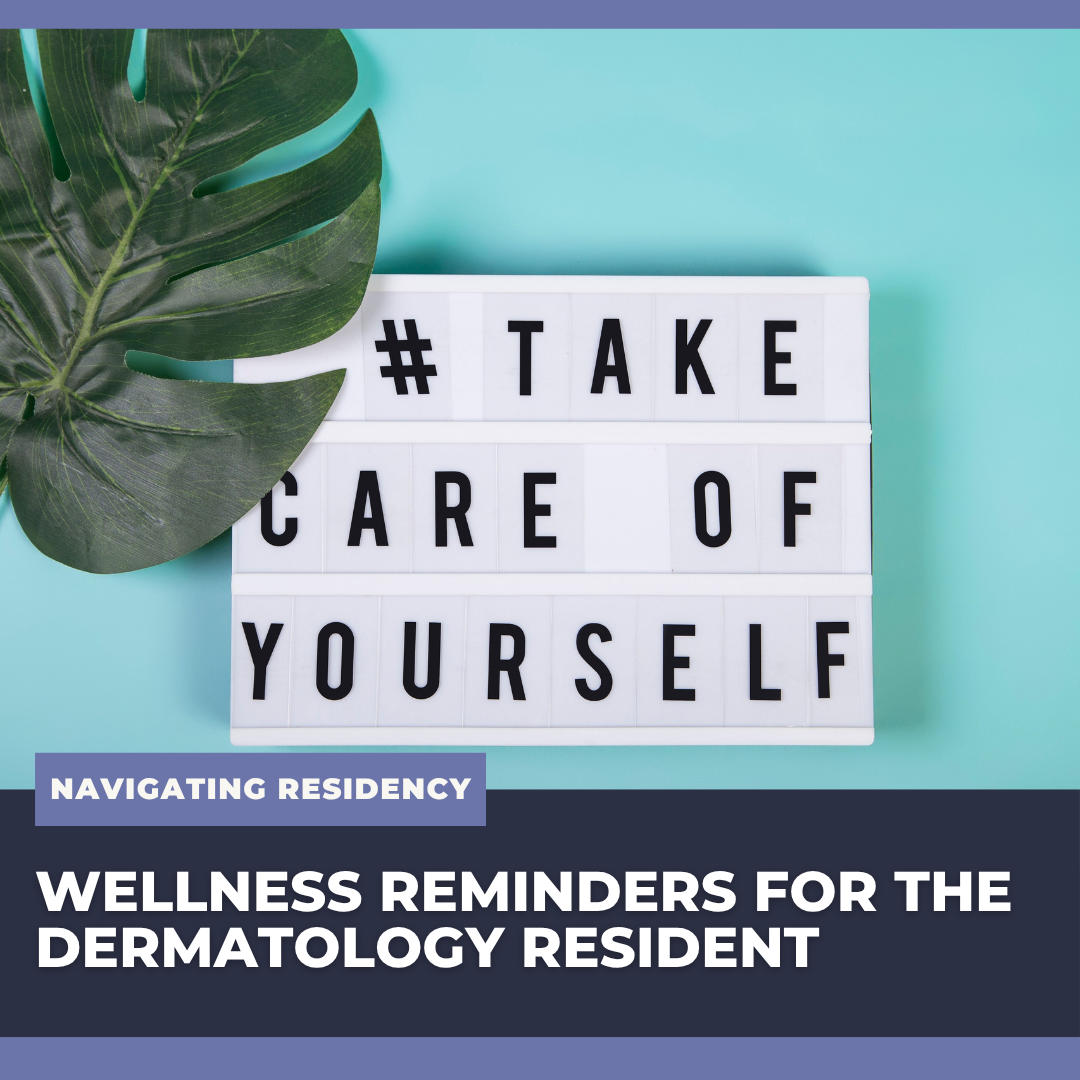You’ve worked incredibly hard to match into dermatology residency. While we may not be managing as many overnight calls, emergencies, or inpatient consults like our colleagues in other specialties, the demands of dermatology residency are uniquely challenging in their own right.
Between reading assignments, studying for exams, didactic presentations, the pressure to publish, expectations to present at conferences, and, of course, the day-to-day responsibility of caring for patients, it can be difficult to find balance and free time.
Below are some wellness strategies that many of us already know but need regular reminders to prioritize. Consider this your gentle nudge to take a step back, reflect, and refocus.
Use Your Time Off
Take your PTO and don’t feel bad about it. Plan vacations, whether they’re short getaways or longer restorative breaks. Yes, money may be tight, but most of us rarely regret spending on a memorable experience. So go ahead. Plan that national park adventure or European escape. It’s also okay to do a stay-cation without the pressure to do anything fancy! Your patients want you rejuvenated and feeling your best.
Communicate Early and Often
Stay transparent with program leadership. Talk to your chief resident, program director, and program coordinator about small issues before they become bigger ones. It is their job to help you succeed. Probably from an ACGME standpoint, big problems = lots of paperwork, and nobody wants that. For example, if religious holidays, family events, or unexpected circumstances might negatively impact your ability to fulfill academic duties, let your team know as soon as possible. You may be able to swap responsibilities with another resident.
Build Your Support Network
Get to know your attendings and co-residents. They are all key parts of your daily support system. It’s more enjoyable to go to work when you know your colleagues and they know you. Positive relationships at work make everything easier and more enjoyable. And this includes your office staff. If you’re in a new environment and struggle to remember names, write them down. Part of being a good clinician is making your staff feel recognized. They’ll support you if you support them.
Broaden Your Circle
Build friendships both within and beyond dermatology. Connecting with residents from other programs can expose you to different perspectives and may open doors to valuable career opportunities down the line. Conferences like the AAD or your state dermatology society are great ways to meet residents from other institutions. At the same time, developing positive relationships with others outside of medicine can provide a much-needed mental escape from the demands of residency. Whether it’s through a book club, fitness class, run club, or faith group, developing meaningful connections beyond work can enrich your life in unexpected ways.
Prioritize Your Health
Set a good example for your patients by prioritizing your health. Your health matters too. Move your body daily, even if all you can squeeze in is a 15-minute walk around the block. Eat real food and minimize excessive alcohol consumption. Be proactive about scheduling your doctor’s appointments, which can otherwise be easy to neglect. Understand your insurance plan. You may be surprised at what services are covered at little to no cost, including therapy and a registered dietitian.
Find An Accountability Partner
Studying in residency feels different from medical school. There are fewer exams and more autonomy. Studying can be isolating, and it can be easy to fall behind. Find a rhythm that works for you, and pair up with a co-resident to stay accountable. Consider signing up for the same cores so you have a friend to study with.
Stay Connected to Home
Check in with your loved ones. Your parents are probably wondering if you’re sleeping enough and eating well. Your friends may be wondering when they will see you next. Even a five-minute call can mean a lot to those who care about you. If not a phone call, at least a text.
Explore Your Surroundings
Don’t let residency pass you by without exploring the city you’re living in. Try new restaurants, attend local events, or take the scenic route home. If your program allows it, take advantage of industry-sponsored dinners and events. Trying new places is better when someone else is paying for it. It’s hard to predict with certainty whether you’ll end up signing on in the same city that you’re training or if you’ll end up moving again after graduation. Either way, embrace the city you’re living in and make the most of it.
Stay Organized
Create simple systems to track your tasks and deadlines. I use a combination of the Apple Calendar app, Notes app, and the “Remind Me” feature in the Email app. Maybe you’re a paper-and-pen kind of person. Find what works for you and stay consistent. If a necessary task takes less than five minutes to accomplish, do it ASAP. Delaying small tasks can lead to unnecessary stress later on.
Give Yourself Grace
Residency is hard. You won’t be perfect, and you don’t need to be. Most of the time, your patients aren’t critically ill. It’s okay if your grand rounds presentation or journal club presentation isn’t perfect. Most people won’t notice small mistakes, and if they do, they’ll probably forget them. You’ve already matched into one of the best specialties. Unless something truly goes wrong, you’re going to graduate and become a dermatologist. Give yourself permission to learn, stumble, and grow.
Did you enjoy this article? Find more on Navigating Residency here.

